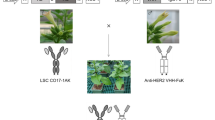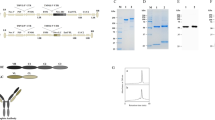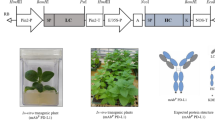Abstract
Large-scale production of therapeutic proteins in transgenic plants has several advantages over other expression systems such as mammalian cell lines. Monoclonal antibodies (mAbs) recognize several specific epitopes highly expressed on the surface of cancer cells and can enhance the anticancer efficacy of antibody-mediated targeted immunotherapy. We describe the expressions of multiple mAbs in a single F1 tobacco line obtained through cross-pollination between a transgenic line expressing anticancer mAbP CO17-1A (mAbP CO) and another expressing anticancer mAbP BR55 (mAbP BR), which recognize GA733 and Lewis-Y antigens, respectively, which are found on human colorectal cancer cells. The presence of heavy chains (HCs) and light chains (LCs) in mAbs and their protein sizes were confirmed by immunoblotting analysis. N-glycan structure analysis showed similar glycan structure profiles between individually expressed mAbs (mAbP CO and mAbP BR) and multiple mAbs (mAbP CO × BR). The interaction of GA733 with mAbP CO was tested using surface plasmon resonance, and the results showed that mAbP CO × BR had lower binding affinity to the antigen compared to individual mAb CO. Boyden chamber assay indicated that mAbM CO, mAbP CO, and mAbP CO × BR had similar inhibitory properties against migration of colon cancer cell. The antibody-dependent cell-mediated cyctotoxicity assay showed a significant synergistic effect of mAbP CO × BR on colorectal cancer cell. These results suggested that the F1 plants produced both mAbP CO and mAbP BR, but the HCs and LCs of mAbP CO and mAbP BR were randomly assembled in a single plant, resulting in chimeric HC and LC assemblies.







Similar content being viewed by others
References
Brodzik R, Glogowska M, Bandurska K, Okulicz M, Deka D, Ko K, van der Linden J, Leusen JH, Pogrebnyak N, Golovkin M, Steplewski Z, Koprowski H (2006) Plant-derived anti-Lewis Y mAb exhibits biological activities for efficient immunotherapy against human cancer cells. Proc Natl Acad Sci USA 103:8804–8809
Dobhal S, Chaudhary VK, Singh A, Pandey D, Kumar A, Agrawal S (2013) Expression of recombinant antibody (single chain antibody fragment) in transgenic plant Nicotiana tabacum cv Xanthi. Mol Biol Rep 40:7027–7037
Gutierrez SP, Saberianfar R, Kohalmi SE, Menassa R (2013) Protein body formation in stable transgenic tobacco expressing elastin-like polypeptide and hydrophobin fusion proteins. BMC Biotechnol 13:40. doi:10.1186/1472-6750-13-40
Ho SC, Koh EY, van Beers M, Mueller M, Wan C, Teo G, Song Z, Tong YW, Bardor M, Yang Y (2013) Control of IgG LC: HC ratio in stably transfected CHO cells and study of the impact on expression, aggregation, glycosylation and conformational stability. J Biotechnol 165:157–166
Jamal A, Jeong-Hwan L, Kyung-Jin L, Doo-Byoung O, Deuk-Su K, Kyoung-Ki L, Young-Kug C, Kyung-A H, Kisung K (2012) Chimerism of multiple monoclonal antibodies expressed in a single plant. Hortic Environ Biotechnol 53:544–551
Jin T, Wang J, Zhu X, Xu Y, Zhou X, Yang L (2015) A new transient expression system for large-scale production of recombinant proteins in plants based on air-brushing an Agrobacterium suspension. Biotechnol Rep 6:36–40
Kim DS, Shao Y, Lee JH, Yoon JS, Park SR, Choo YK, Hwang KA, Ko K (2011) Expression of anti-breast cancer monoclonal antibody in transgenic plant. Kor J Environ Agric 30:390–394
Kim DS, Qiao L, Lee KJ, Ko K (2015) Optimization of colorectal cancer vaccine candidate proteinGA733-Fc expression in a baculovirus-insect cell system. Entomol Res 45:39–48
Ko K, Tekoah Y, Rudd PM, Harvey DJ, Dwek RA, Spitsin S, Hanlon CA, Rupprecht C, Dietzschold B, Golovkin M, Koprowski H (2003) Function and glycosylation of plant-derived antiviral monoclonal antibody. Proc Natl Acad Sci USA 100:8013–8018
Ko K, Steplewski Z, Glogowska M, Koprowski H (2005) Inhibition of tumor growth by plant-derived mAb. Proc Natl Acad Sci USA 102:7026–7030
Kwak DH, Moussavou G, Lee JH, Heo SY, Ko K, Hwang KA, Jekal SJ, Choo YK (2014) Growth suppression of colorectal cancer by plant-derived multiple mAb CO17-1Ax BR55 via inhibition of ERK1/2 phosphorylation. Int Mol Sci 15:21105–21119
Lee JH, Park DY, Lee KJ, Kim YK, So YK, Ryu JS, Oh SH, Han YS, Ko K, Choo YK, Park SJ, Brodzik R, Lee KK, Oh DB, Hwang KA, Koprowski H, Lee YS, Ko K (2013) Intracellular reprogramming of expression, glycosylation, and function of a plant-derived antiviral therapeutic monoclonal antibody. PLoS One 8:e68772
Lee JH, Hwang KA, Park S, Choo Y-K, Ko K (2014) Expression of recombinant anti-breast cancer immunotherapeutic monoclonal antibody in baculovirus-insect cell system. Entomol Res 44:207–214
Lim CY, Kim DS, Lee KJ, Hwang KA, Choo YK, Ko K (2014) Optimization of storage temperature for the pollen viability of transgenic plants that express the anti-breast cancer monoclonal antibody mAb BR55. Plant Omics J 7(5):403–409
Lim CY, Lee KJ, Oh DB, Ko K (2015) Effect of the developmental stage and tissue position on the expression and glycosylation of recombinant glycoprotein GA733-FcK in transgenic plants. Front Plant Sci 5:778. doi:10.3389/fpls.2014.00778
Ling W, Deng L, Lepore J, Cutler C, Cannon-Carlson S, Wang Y, Voloch M (2003) Improvement of monoclonal antibody production in hybridoma cells by dimethyl sulfoxide. Biotechnol Prog 19:158–162
Lu Z, Lee KJ, Shao Y, Lee JH, So Y, Choo YK, Oh DB, Hwang KA, Oh SH, Han YS, Ko K (2012) Expression of GA733-Fc fusion protein as a vaccine candidate for colorectal cancer in transgenic plants. J Biomed Biotechnol 2012:1–11
Packer NH, Lawson MA, Jardine DR, Redmond JW (1998) A general approach to desalting oligosaccharides released from glycoproteins. Glycoconj J 15:737–747
Park KT, Burnett S, Davis WC (2015) Development and characterization of a monoclonal antibody specific for bovine CD209. Vet Immunol Immunopathol 163:216–220
Paul M, Ma JK (2011) Plant-made pharmaceuticals: leading products and production platforms. Biotechnol Appl Biochem 58:58–67
Rodriguez M, Perez L, Gavilondo JV, Garrido G, Bequet-Romero M, Hernandez I, Huerta V, Cabrera G, Perez M, Ramos O, Leyva R, Leon M, Ramos PL, Triguero A, Hernandez A, Sanchez B, Ayala M, Soto J, Gonzalez E, Mendoza O, Tiel K, Pujol M (2013) Comparative in vitro and experimental in vivo studies of the anti-epidermal growth factor receptor antibody nimotuzumab and its aglycosylated form produced in transgenic tobacco plants. Plant Biotechnol J 11:53–65
Sack M, Hofbauer A, Fischer R, Stoger E (2015) The increasing value of plant-made proteins. Curr Opin Biotechnol 32:163–170
Sexton A, Harman S, Shattock RJ, Ma JK (2009) Design, expression, and characterization of a multivalent, combination HIV microbicide. FASEB J 23:3590–3600
So Y, Lee KJ, Kim DS, Lee JH, Oh DB, Hwang KA, Ko K, Choo YK, Ko K (2012) Glycomodification and characterization of anti-colorectal cancer immunotherapeutic monoclonal antibodies in transgenic tobacco. Plant Cell Tissue Organ Cult (PCTOC) 113:41–49
Song I, Kim DS, Kim MK, Jamal A, Hwang KA, Ko K (2015) Comparison of total soluble protein in various horticultural crops and evaluation of its quantification methods. Hortic Environ Biotechnol 56:123–129
Tekoah Y, Ko K, Koprowski H, Harvey DJ, Wormald MR, Dwek RA, Rudd PM (2004) Controlled glycosylation of therapeutic antibodies in plants. Arch Biochem Biophys 426:266–278
Verch T, Hooper DC, Kiyatkin A, Steplewski Z, Koprowski H (2004) Immunization with a plant-produced colorectal cancer antigen. Cancer Immunol Immunother 53:92–99
Yesilirmak F, Sayers Z (2009) Heterelogous expression of plant genes. Int J Plant Genom 2009:296482
Acknowledgments
This research was supported by a grant (Code# PJ0111102015) from the Korean Rural Development Administration, the National Research Foundation of Korea Grant funded by the Korean Government (MEST) (NRF-2014R1A2A1A11052922).
Author information
Authors and Affiliations
Corresponding author
Rights and permissions
About this article
Cite this article
Kim, DS., Lee, SH. & Ko, K. Expression and function of plant-derived recombinant multiple monoclonal antibodies for the recognition of human colorectal cancer cells. Plant Biotechnol Rep 9, 361–368 (2015). https://doi.org/10.1007/s11816-015-0373-4
Received:
Accepted:
Published:
Issue Date:
DOI: https://doi.org/10.1007/s11816-015-0373-4




